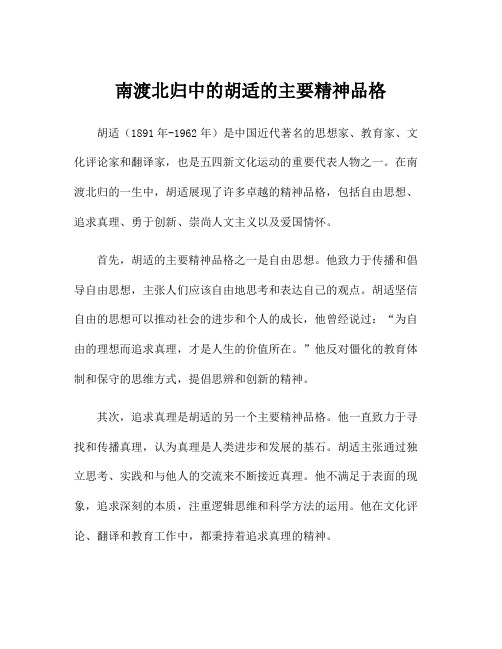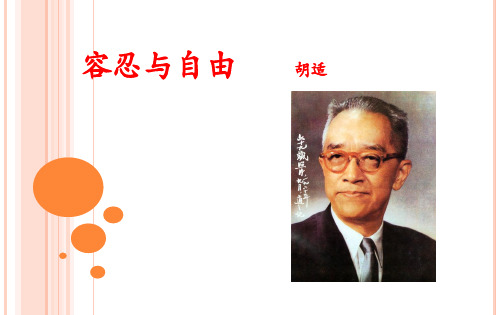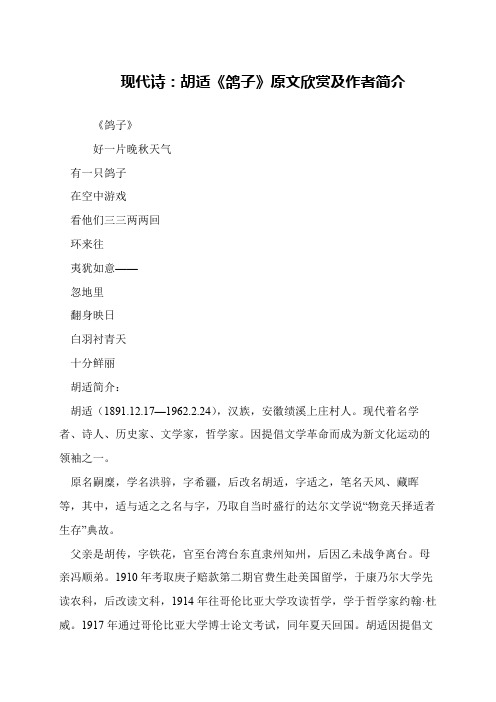文学家胡适的简介
南渡北归中的胡适的主要精神品格

南渡北归中的胡适的主要精神品格胡适(1891年-1962年)是中国近代著名的思想家、教育家、文化评论家和翻译家,也是五四新文化运动的重要代表人物之一。
在南渡北归的一生中,胡适展现了许多卓越的精神品格,包括自由思想、追求真理、勇于创新、崇尚人文主义以及爱国情怀。
首先,胡适的主要精神品格之一是自由思想。
他致力于传播和倡导自由思想,主张人们应该自由地思考和表达自己的观点。
胡适坚信自由的思想可以推动社会的进步和个人的成长,他曾经说过:“为自由的理想而追求真理,才是人生的价值所在。
”他反对僵化的教育体制和保守的思维方式,提倡思辨和创新的精神。
其次,追求真理是胡适的另一个主要精神品格。
他一直致力于寻找和传播真理,认为真理是人类进步和发展的基石。
胡适主张通过独立思考、实践和与他人的交流来不断接近真理。
他不满足于表面的现象,追求深刻的本质,注重逻辑思维和科学方法的运用。
他在文化评论、翻译和教育工作中,都秉持着追求真理的精神。
第三,胡适具有勇于创新的精神品格。
他不满足于传统的束缚和旧有的观念,勇于突破和改革。
胡适是中国现代散文的奠基人之一,他运用自由而敏锐的观察力,以独特的视角去书写生活和社会。
他主张文学应该贴近生活、反映现实,具有积极的社会价值。
胡适在翻译领域也有杰出的贡献,通过翻译西方文学作品,他引领了中国文学的现代化。
他的创新精神不仅在文学上有所体现,还体现在教育改革和思想启蒙上。
第四,胡适崇尚人文主义。
他强调人的尊严和自由,认为人文精神是社会进步的基石。
他主张人文教育,注重培养人的综合素质和批判思维能力。
胡适提倡个人主义和人道主义的价值观,认为每个人都有追求幸福和实现个人价值的权利。
最后,胡适怀有强烈的爱国情怀。
他深爱着自己的祖国,关心中国的命运和未来。
在他南渡期间,他深刻地反思了中国的落后和不足之处,并提出了一系列的改革主张。
胡适呼吁中国人民要有自信、勇敢地面对现实和未来。
他对中国的现代化进程起到了积极的推动作用。
胡适先生生平年表

胡适先生生平年表一八九一年一岁十二月十七日生于上海大东门外。
一八九二年二岁二月底随母冯顺弟移居浦东。
一八九三年三岁二月随母去台湾其父胡传任所,先住台南,后迁台东。
一八九四年四岁在台东由胡传教认方块汉字。
一八九五年五岁二月因中日战争爆发,随母离台湾回上海。
三月去祖籍安徽绩溪上庄,进家熟读书。
八月胡传(铁花)病死于厦门。
一八九六年六岁在家塾读书。
一八九七年七岁在家塾读书。
一八九八年八岁在家塾读书。
一八九九年九岁在家塾读书。
开始接触中国古典小说。
一九○○年十岁在家塾读书。
一九○一年十一岁在家塾读书。
《资治通鉴》中引述范缜《神灭论》片断,对其影响极深。
一九○二年十二岁在家塾读书。
一九○三年十三岁在家塾读书。
开始学“反切”。
一九○四年十四岁一月与江冬秀订婚。
二月从三兄到上海,进梅溪学堂。
是年读梁启超的《新民说》和邹容的《革命军》。
一九○五年十五岁春澳进澄衷学堂,在那读了严复译的《天演论》和《群己权界论》等书。
一九○六年十六岁暑间考取中国公学。
是年加入“竞业学会”,并在《竞业旬报》上发表小说、诗歌与文章。
一九○七年十七岁仍在中国公学读书。
五月至七月因脚病回绩溪疗养。
一九○八年十八岁七月主编《竞业旬报》。
九月转入中国新公学,兼任英文教员。
一九○九年十九岁十月新公学解散,因失学失业,在上海过放荡生活。
一九一○年二十岁春在华童公学教国文。
五月同二哥绍之去北京温习功课。
七月考取清华庚子赔款留学美国官费生,因用“胡适”的名字报考,此后就正式叫胡适。
八月十六日,从上海坐船去美国。
九月入康乃尔大学,选读农科。
一九一一年二十一岁仍在康乃尔大学农学院学习。
七月被举为赔款学生会中文书记。
一九一二年二十二岁九月转入文学院,修哲学、经济、文学。
十一月发起组织“政治研究会”。
十二月代表康乃尔大学大同会,到费城参加世界大同总会,被推为宪法部干事。
一九一三年二十三岁仍在康乃尔大学文学院学习。
五月被举为世界学生会会长。
一九一四年二十四岁四月被委为康乃尔大学学生学生会哲学群学部部长。
胡适英文简介

胡适英文简介胡适,著名思想家、文学家、哲学家。
以倡导“白话文、领导新文化运动闻名于世。
下面是店铺给大家整理的胡适英文简介,供大家参阅!胡适简介Hu Shi (December 17, 1891 - February 24, 1962), formerly known as heir, scientific name Hong 骍, word Xi Jiang, pseudonym Hu Shi, the word appropriate. Famous thinker, writer, philosopher. Huizhou Jixi people to promote the "vernacular, leading the new cultural movement famous."Juvenile study in the hometown private school, 19-year-old admitted Gengzi compensation officer fee students, studying in the United States, under the tutor John Dewey, 1917 summer home, employed as Peking University professor. In 1918 to join the "new youth" editorial department, vigorously promote the vernacular, to promote individual liberation, freedom of thought, and Chen Duxiu with the new cultural movement leader. His article from the perspective of the creation of the distinction between old and new literature, to promote the creation of new literature, translation of France, Germany, Maupassant, Norway Ibsen part of the works, and took the lead in the creation of vernacular literature. The vernacular poems he published in 1917 were the first new poems in the history of modern literature. Hu Shi believes in experimentalist philosophy. "May Fourth Movement", with Li Dazhao, Chen Duxiu and other Marxist intellectuals to separate ways, from the "problem and doctrine of the dispute" to open its end, advocate improvement, since he changed his "20 years talk about politics; Political "attitude. He was in the 1920s to do "effort weekly", 1930 years to do"independent commentary", 1940 years to do "independent when the society." 1938 ~ 1942 as the National Government ambassador to the United States. In 1939 the Nobel Prize for Literature was nominated. 1946 ~ 1948 served as president of Peking University. Went to the United States in 1949. In 1952 he returned to Taiwan as president of the Central Research Institute. Died in Taipei in 1962.Hu Shi's academic activities are mainly in the aspects of literature, philosophy, history, textual research, pedagogy and red learning. The main works are "Outline of Chinese Philosophy" (Shang), "Try", "History of Vernacular Literature" And "Hu Shiwen" (four sets) and so on. He is the greatest academic impact is to promote the "bold assumptions, careful confirmation" of the scholarship.胡适人物生平AD 1891, December 17 was born in Jiangsu Province, Songjiang House Chuansha County (now Shanghai Pudong New Area). In 1893, with his mother Feng Shun brother to Taiwan's father Hu Chuan any office.In 1894, the Sino-Japanese war broke out, with the mother left Taiwan to return to Shanghai, after returning home Anhui Province, Anhui Province Jixi County on the village, into the home school. His father died in Xiamen.AD 1904, and Jiang Dongxiu engagement, from three brothers to Shanghai, into the Meixi small school.In 1905, into the courtesy school.In 1906, the Chinese public school was admitted.AD 1908, into the Chinese new public school, part-time English teacher.In 1910, studying in the United States, into the CornellUniversity selected agriculture.In 1915, into the Department of Philosophy at Columbia University, under the tutelage of John Dewey.In 1917, in the "new youth" published "literary reform". In the same year, through the final examinations of Ph.D. degrees, returned to Peking University professor, to participate in the editor of "new youth", return to Anhui Jixi and Jiang Dongxiu marriage.In 1919, he took the "weekly commentary", published "more research on some issues, less talk about doctrine", advocated reformism, provoke the issue and the issue of debate.AD 1920, left the "new youth", lectures at the summer school in Nanjing University.AD 1921, as "Mr. Dewey and China".In 1922, he served as Dean of Peking University and Acting liberal arts seniors, founder of "effort weekly". In its second phase (May 14, 1922) and Cai Yuanpei, Li Dazhao, Tao Xingzhi, Liang Shuming and other joint published "our political proposition."In 1924, with Chen Xiying, Wang Shijie founded the "modern commentary" magazine.AD 1925, February to participate in the Beijing aftermath of the meeting, and participate in the drafting of part of the meeting documents.In 1926, with his teacher Guo Bingwen and others in the United States initiated the establishment of China and the United States Association. Travel to Britain, France, the United States, Japan.In 1927, he obtained a doctorate degree in philosophy from Columbia University. And Xu Zhimo and other organizations set up a new bookstore. In Chiang Kai-shek in Shanghai and SongMeiling wedding to meet Chiang Kai-shek.In 1928, the founder of the "crescent" monthly magazine, as the Chinese public school principals.In 1929, in the "New Moon" magazine published "human rights and law" article, marking the beginning of the human rights movement, then published "when we can have a constitution - for the founding outline of the question", " A Brief Comment on Sun Yat - sen 's Comment on "Easy to Know" and "New Culture Movement and the Kuomintang".In 1930, Hu Shi, Luo Longji, Liang Shiqiu three articles on human rights issues for the "Human Rights Collection" to the crescent bookstore published, after the Kuomintang government banned. April 10 in the "we go the way" that: "to eradicate the down is poverty, disease, ignorance, corruption, disrupting the five enemies."In 1932, he served as Dean of the Faculty of Arts of Peking University and Director of the Department of Chinese Literature, and invited Jiang Tingfu, Ding Wenjiang, Fu Sinian and Weng Wenhao to set up "Independent Review". Hu Shi has written 1309 articles for him.In 1935, arrived in Hong Kong on January 4, stay five days, mainly to accept the University of Hong Kong honorary doctorate degree. Repeatedly requested as ambassador to Japan unsuccessful.In 1937, after the July 7 incident, Chiang Kai-shek on August 19, 1937 asked Hu to visit the United States today for US support for China. In 1938, the Chinese ambassador to the United States.AD 1942, September 8 resigned as ambassador to the United States, living in New York, engaged in academic research.In 1943, he was appointed Honorary Advisor to the EasternLibrary of the United States.In 1944, lectures at Harvard University in September.In 1945, representatives of the delegation of the Nationalist Government of the Republic of China attended the United Nations Constituent Assembly in San Francisco and attended the United Nations Educational, Scientific and Cultural Organization in London as the chief representative of the delegation of the Government of the Republic of China to formulate the charter of the organization.In 1946 July returned to Peking, he served as president of Peking University. On November 28, Chiang Kai-shek proposed "the draft constitution of the Republic of China" to the National Assembly and solemnly gave a lecture on the main points of the meeting, which was accepted by the President of the General Assembly. On December 25, the National Assembly officially approved the adoption of the draft constitution, the National Assembly closed, by Chiang Kai-shek on behalf of the National Government to accept Hu Shi submitted to the Constitution.On January 24, 1947, Chiang Kai-shek wanted Hu to serve as the examiners of the Republic of China and members of the State Council, but Hu would insist on joining the National Government. In April, Wang Yaowu Ji Ji Xian Lin to Hu Shi to send a letter, to pay tribute and greetings, and invited Hu Shi in convenient time to visit Jinan for academic lectures. Immediately get a reply, Hu agreed to the camera to Jinan and education counterparts to study the Shandong counterparts education.April 3, 1948 Chiang Kai-shek that the Republic of China Constitution for the cabinet system, the real power in the cabinet, the President of the Republic of China should be virtual, please justice is better, so I would like to call the Chinese Kuomintangsupport non-party Hu Shi Ming election The first president, such as Hu Shi became president and then appointed Chiang Kai-shek for the Chief Executive of the Republic of China, Hu Shi agreed, but later because of the Kuomintang Executive Council or support Chiang Kai-shek's president and change. November the Chinese People's Liberation Army soldiers north of the city, with radio stations call Hu to leave to serve as president of Peking University, Hu was unmoved, decided to leave Peking. December Peiping North China to suppress the commander Fu Zuoyi invited Hu Shi in Zhongnanhai Huai Ren Tang to discuss is the war and, Hu sent eight words and more than the war, insisted to be changed. December 13 Zhu Jiahua, Fu Si Nian, Yu Dawei, Chen Xueping four people in Nanjing trying to send a plane to take Hu Shi Nan. The insistence on refusing to leave Peking University regardless. December 14 in the persuasion of Nanjing to leave. December 15 at 4 pm, Fu Zuoyi sent troops to escort Hu to Beijing Nanyuan International Airport on the plane. At ten o'clock in the evening arrived at Nanjing Ming Palace Airport.On March 9, 1949, Chiang Kai-shek sent Chiang Ching-kuo to Shanghai to visit Hu Shi. On April 6, Hu Shih asked for the US government to seek a peaceful solution to the civil war between the Kuomintang and the Communist Party of China from the request of the Government of the Republic of China to take the United States from Shanghai to the United States. April 21, the ship arrived in San Francisco, that April 19, 1949 the government refused to 24 requests from the CPC, the Chinese People's Liberation Army has crossed the river, this time the situation has been set, Hu Shi in the United States everywhere, and published "Communist Party ruled no Free ", travel to the United States, and Zhang Ailing met, forged friendship. "Free China" founded, HuShi Ren nominal issuer. June 7, the new chief executive of the Republic of China Yan Xishan issued Hu Shi as foreign minister, but Hu refused to take office.At the beginning of March 1950, Hu Shi went to Washington to attend the meeting of the China Education and Culture Foundation, and was pushed to the chairman of the meeting. Candidates are Princeton University Director of the East Asia Library. On June 23, the US Assistant Secretary of State for Asia-Pacific Affairs, Dean Rusk, met Hu Shih, trying to persuade Hu to come forward to lead the government of exile and Taiwan's anti-communist pro-United States to replace Chiang Kai-shek's regime.In 1952, Hu Shi and Jiang Tingfu in New York intends to jointly organize the opposition party in Taiwan to implement democratic politics, but in Hu Shih returned to Chiang Kai-shek after the discussion, was Chiang Kai-shek's opposition, resulting in party failure.From February to March 1954, sixty-four-year-old Hu Shi went to Taiwan to attend the "second session of the first national assembly" as "temporary chairman".In 1955, the Chinese mainland set off the criticism of Hu Shi movement, life, reading, new knowledge of the triple bookstore published "Hu Shi thought critical essays compilation", Hu live in the United States to collect the eight books, made a serious comment. And criticized the cause of Hu's movement, according to Geng Yunzhi's argument is: this sentence I think he was in his life, talking about the most gentleman's grace, Hu Shi said that according to Mao Zedong's level of his examination of Peking University is not test, Mao Zedong is very decisive to launch a national scale of the complete criticism of Hu's movement.In 1957, he served as dean of the Central Research Institute of the Republic of China.In 1958 April returned to Taiwan to settle in office. Since then, Hu for many hours to and from Taiwan, the United States and the two places. During the period because of economic relations, the "Hu Shiwen election" and "Hu Shi readme" and all other works, buyout way to sell and publish the company.In 1959, he served as chairman of Taiwan's long-term scientific development committee.AD 1960, Lei Zhen and Taiwan, Hong Kong people outside the party together against Jiang Zhongzheng violation of the Constitution of the Republic of China three re-president, Hu Shi as one of the joint. Later, Lei Zhen preparations for party affairs, Hu did not participate, but more encouraged. In September 1960, Lei Zhen was arrested for the "spy" case, the name of Lei Zhen event, and this event is generally considered to Chiang Kai-shek to prevent Lei Zhen set new party planning. At that time, he was still the president of the Central Research Institute, although he was not affected by the case, but also involved in the rescue Lei Zhen, but did not succeed. Hu Shi had left three thousand words of the diary description of the beginning and ending.In February 1961, Hu Shi participated in the banquet of Taiwanese university principal Qian Siliang, who was physically ill when he arrived and sent to the hospital to jump to 135 times. The blood of the sputum was diagnosed as coronary atherosclerotic heart disease. The hospital in February, after home self-support, but the body has become increasingly weak. November illness deteriorated, to the Taiwan University School of Medicine convalescence.In 1962, he was discharged from the hospital. February 24 atthe Central Research Institute opened a cocktail when the heart disease died in Taipei City, Taiwan Province, Nan Gang District, Hu Shi died to get mourning. On the 1st of March, Chiang Kai-shek went to the sacrifice of the sacrifice, and the proclamation of the couple himself, the teacher of eternity, the old morality of the new culture, and the new thought of old ethics. Then Chiang wrote in his diary of Hu's death that he had heard of Hu's heart attack and did a barrier to the cause of revolution.。
容忍与自由

胡适的这篇文章最初发表于台湾出版的《自由中国》1959 年3月14日第26卷第6期。
《自由中国》是胡适与雷震(1897—1979)于1949年共同创 办的政论性半月刊杂志,胡适担任发行人,雷震负责际运作。容忍与自由 胡适
一、胡适生平
胡适(1891年12月17日-1962年2月24日),生于松江。原 名嗣穈,字希疆,笔名胡适,字适之。著名思想家、文学家、哲 学家。 徽州绩溪人,以倡导“白话文、领导新文化运动闻名于 世。”
19岁考取庚子赔款官费生,留学美国,赴美康奈尔大学留学, 先读农科,后改读文科。1914年往哥伦比亚大学攻读哲学,师从 哲学家约翰·杜威,1917年夏回国,受聘为北京大学教授。1918 年加入《新青年》编辑部,大力提倡白话文,宣扬个性解放、思 想自由,与陈独秀同为新文化运动的领袖。
“五四运动”后,同李大钊、陈独秀等接受马克思主义的知 识分子分道扬镳, 1938~1942年出任国民政府驻美大使。 1946~1948年任北京大学校长。1949年去美国。1952年返台 湾任中央研究院院长。1962年在台北病逝。
胡适是五四运动的轴心人物之一。也是第一位提倡白话文的 学者,致力于推翻二千多年的文言文。
2.包办婚姻:胡适与江冬秀
胡适与结发妻子江冬秀的婚姻是其母亲冯顺弟一手包办的。 在胡适13岁时,随同父异母哥哥到上海读书。临行前他的母亲 为他订了婚。未婚妻是旌德县的望族江家的小脚千金江冬秀。 胡适对这门婚事不感兴趣,可是他对母亲非常孝敬,就默认了。 1917年秋天,胡适获得哥伦比亚大学的哲学博士后,应聘为北 京大学教授。同年12月,胡适尊奉母命,在老家与比他大一岁 的江冬秀举行新式婚礼。1923年7月胡适向江冬秀提出离婚。 江冬秀以杀死两个儿子相威胁,胡适便不敢再提离婚之事。
胡适写作特点

胡适原名嗣穈,学名洪骍,参加“庚款”留学考试时改名胡适,字适之.先生1891年2月17日生于上海大东门外,世为安徽绩溪人.其父胡传(字铁花,号钝夫),清岁贡生,官至淞沪厘卡总巡、台东直隶州知州,有著作《台湾纪事两种》传世.先生一生领尽风骚,1962年2月24日于中央研究院院长任上逝世,享年72.胡适5岁开蒙,在绩溪老家私塾受过9年旧式教育,打下一定的旧学基础.1904年到上海进新式学校,接受《天演论》等新思潮,并开始在《竞业旬报》上发表白话文章.1910年夏赴美留学,先入康乃尔大学习农科,后转入文科;1915年进哥伦比亚大学,追随实用主义哲学家杜威学习哲学.1917年完成博士学位论文《古代中国逻辑方法之进化》.在此期间,胡适热心探讨文学改良方案,并试作白话诗.而与《新青年》主编陈独秀的通信,以及《文学改良刍议》一文的发表,更引发了一场声势浩大影响深远的文学革命.同年胡适学成归国,被聘为北京大学教授,并参与《新青年》杂志的编辑,至此一发而不可收,成为新文化运动的主将之一. 五四时期,胡适连续撰写《历史的文学观念论》、《建设的文学革命论》等文,提倡“国语的文学,文学的国语”,并相继完成《国语文法概论》、《白话文学史》等著作,对白话文取代文言文而成为现代中国人重要的思想和交流工具起了决定性作用.在理论倡导的同时,胡适还进行了一些文学创作的“尝试”.其小说、剧本均未见成功,独有出版于1902年的《尝试集》,乃文学史上第一部白话新诗集,颇有开拓之功.文学创作非其所长,在新文化运动中,胡适另一主要贡献是输入新思想.其《易卜生主义》、《贞操问题》,当年都是振聋发聩之作.而从问题与主义之争,到《人权论集》,再到主办《独立评论》,胡适始终坚持独立姿态和批判精神.抗战军兴,胡适出任驻美大使;胜利后又先后担任北京大学校长和中央研究院院长.但其始终保持书生本色,不曾背叛五四主义知识分子.胡适称新文化运动为“中国的文艺复兴”,并断言其有四重目的:研究问题;输入学理;整理国故;再造文明.照他的理解,所谓整理国故,就是用科学方法对三千年来破碎的古学进行一番有系统的研究.故胡适治学特重方法,屡次撰文介绍清儒与西哲的“科学方法”,以至于再三声称他的学术研究都是为了证明并推广其“科学方法”.胡适治学有两个主要领域,一是中国哲学史,一是中国文学史.尽管《中国哲学史大纲》只出版了上卷,《白话文学史》也没有下编,可这两部书都是建立规范并奠定学科基础的经典性著作.后人可以赞赏,也可以批评,却无法漠视其存在.前者的平视诸子以及历史的眼光,后者的双线文学观念,都是对本世纪学术发展影响甚深的“大胆假设”.另外,他首创新红学,重修禅宗史,以及用历史演进法来研究中国章回小说,都是开一代新风,功不可没.抗战以后,因奔走国事,再加上自身学术路数的内在限制,胡适学术上未能更上一层楼.晚年沉醉于《水经注》疑案,下力甚大,可惜成果不尽如人意.。
现代诗:胡适《鸽子》原文欣赏及作者简介

学革命而成为新文化运动的领袖之一。 胡适历任北京大学教授、北大文学院院长、辅仁大学教授及董事、中华民 国驻美利坚合众国特命全权大使、美国国会图书馆东方部名誉顾问、北京大 学校长、中央研究院院士、普林斯顿大学葛思德东方图书馆馆长、中华民国 中央研究院(位于台北南港)院长等职。 胡适深受赫胥黎与杜威的影响,自称赫胥黎教他怎样怀疑,杜威教他怎样 思想。因此胡适毕生宣扬自由主义,是中国自由主义的先驱。提倡怀疑主 义,并以《新青年》月刊为阵地,宣传民主、科学。毕生倡言“大胆的假设, 小心的求证”、“言必有证”的治学方法。 《光明》 朱自清 风雨沉沉的也夜里,前面一片荒郊。 走尽荒郊,便是人们的道。 呀!黑暗里歧路万千,叫我怎样走好? “上帝!快给我些光明罢,让我好向前跑!” 上帝慌着说,“光明? 我没处给你找! 你要光明,你自己去造!” 朱自清简介: 朱自清(1898-1948),原名自毕,字佩弦,号秋实,江苏东海人,中国现 代散文家、诗人。主要作品有诗歌散文集《踪迹》,散文集《背影》、《欧游杂 记》等。 《苍蝇》
其“不可爱”,这样的句式选择本身就很有意思。接着又提出一个反题:“我们 在做小孩子的时候都有点喜欢他”。这样,同一个对象——“苍蝇”就有了不同 的评价;周作人的兴趣在这不同背后的文化与心理,“苍蝇”不过是一个切入 口罢了。 周作人告诉我们,对苍蝇的恶感是因为“现在受了科学的洗礼,知道苍蝇能 够传染病菌”,并因此而将苍蝇引申为“美和生命的破坏者”。这里,无论原本 的医学根据,还是引发的ቤተ መጻሕፍቲ ባይዱ文意义,都是科学理性分析的结果,是一种现代 观念。——有趣的是,周作人对苍蝇的可恶,还作了一个解释:归之于“他的 别一种坏癖气”,“喜欢在人家的颜面手脚上乱爬乱舔”,在被吸者自然是“极 不愉快的事”。但这是一个相当个人化的体验与情感反应,大多数人对苍蝇的 厌恶大概不是由此而发,还是理性在起作用。 周作人简介: 光绪十年(甲申)腊月初一(1885 年 1 月 16 日)生于浙江绍兴。鲁迅二 弟。现代散文家、诗人、文学翻译家,中国新文化运动的代表人物之一。原 名櫆寿,又名奎缓,字星杓,自号启孟、启明(又作岂明)、知堂等。笔名仲 密、药堂、周遐寿等。常以“雨”与“风”一起构成散文的“基本意象”。 1903 年进江南水师学堂学习海军管理,改名为周作人,毕业后考取官费留 学日本。1906 年 7 月到日本攻读海军技术,后改学外国语。此间与羽太信子 (1888-1962)结婚。1911 年回国后在绍兴任中学英文教员。辛亥革命后,任浙 江省军政府教育司视学、绍兴县教育会会长、省立五中教员。1917 年任北京 大学文科教授。 “五四”时期任新潮社主任编辑,参加《新青年》的编辑工作,1921 年参与 发起成立文学研究会,发表了《人的文学》、《平民文学》、《思想革命》等重 要理论文章,并从事散文、新诗创作和译介外国文学作品。 他的理论主张和创作实践在社会上产生了很大影响,成为新文化运动的重
新文化运动之胡适

THANKS
感谢观看
06
总结与评价
胡适在新文化运动中的地位与贡献
倡导白话文
胡适主张以白话文代替文言文,推动文学语言的 现代化,促进了文学的通俗化和普及化。
提倡科学方法
胡适强调科学方法和实证主义,反对传统的信仰 和迷信,对思想界产生了深远的影响。
推动思想自由
胡适倡导思想自由和言论自由,反对思想专制和 政治干预,为学术研究提供了更为宽松的环境。
胡适的科学与民主思想,对当时的中 国社会产生了深远的影响,推动了中 国的现代化进程,使得科学和民主成 为中国的核心价值观。
04
胡适的思想与影响
对传统文化的批判
01
02
03
批判儒家思想
胡适认为儒家思想是封建 社会的产物,主张对其进 行批判和改造,以推动社 会的进步。
提倡科学方法
胡适强调科学方法的重要 性,认为这是推动社会进 步和发展的重要手段。
思想偏颇与局限性
思想偏颇
胡适的思想体系存在一定的偏颇和局限 性,他过于强调西方文化的优越性,忽 视了传统文化的价值和意义。同时,他 的思想也存在着一定的狭隘性和片面性 ,未能全面地认识和理解中国文化的多 元性和复杂性。
VS
局限性表现
在实践中,胡适的思想在推动中国现代化 进程中暴露出了一些局限性。例如,他过 于强调西方的民主、科学等理念,忽视了 中国的实际情况和历史条件,导致了一些 不切实际的改革尝试和政策实施。同时, 他的思想也未能有效地解决中国社会的深 层次矛盾和问题,如阶级矛盾、民族问题 等。
在思想研究方面,胡适主张以科学的 方法研究中国传统文化和思想,认为 只有通过科学的方法才能真正理解中 国传统文化的精髓和价值。
02
新文化运动背景
重读名家:走近胡适

重读名家:走近胡适主持人语:胡适(1891~1962),字适之。
安徽绩溪人。
现代着名学者、诗人、历史学家、文学家、哲学家。
历任北京大学教授、北京大学校长、台湾中央研究院院长等。
中国新文化运动的开拓者之一,美国《展望》杂志曾把他列为当今世界最有影响力的100位伟人之一。
在中国近现代史上,胡适是一个起过重要作用的关键人物。
新中国成立后的很长一段时期,在极左思想的支配下,我们曾将这样一位在中国文化史上重量级的人物贬得一文不值。
现在,我们对胡适总算有了实事求是的评价。
下面三篇文章,将有助于引导同学们走近胡适这位大师。
诸位毕业同学:你们现在要离开母校了,我没有什幺礼物送给你们,只好送你们一句话罢。
这句话是:“不要抛弃学问。
” 以前的功课也许一大部分是为了张毕业文凭,不得已而做的。
从今以后,你们可以依自己的心愿去自由研究了。
趁现在年富力强的时候,努力做一种专门学问。
少年是一去不复返的,等到精力衰减时,要做学问也来不及了。
即为吃饭计,学问也绝不会辜负人的。
吃饭而不求学问,三年五年之后,你们都要被后来少年淘汰的。
到那时再想做点学问来补救,恐怕已太晚了。
有人说:“出去做事之后,生活问题急需解决,哪有工夫去读书?即使要做学问,既没有图书馆,又没有实验室,哪能做学问?” 我要对你们说:凡是要等到有了图书馆方才读书的,有了图书馆也不肯读书。
凡是要等到有了实验室方才做研究的,有了实验室也不肯做研究。
你有了决心要研究一个问题,自然会撙衣节食去买书,自然会想出法子来设置仪器。
至于时间,更不成问题。
达尔文一生多病,不能多做工,每天只能做一点钟的工作。
你们看他的成绩!每天花一点钟看10页有用的书,每年可看3600多页书;30年可读11万页书。
诸位,11万页书可以使你成一个学者了。
可是,每天看三种小报也得费你。
- 1、下载文档前请自行甄别文档内容的完整性,平台不提供额外的编辑、内容补充、找答案等附加服务。
- 2、"仅部分预览"的文档,不可在线预览部分如存在完整性等问题,可反馈申请退款(可完整预览的文档不适用该条件!)。
- 3、如文档侵犯您的权益,请联系客服反馈,我们会尽快为您处理(人工客服工作时间:9:00-18:30)。
文学家胡适的简介
胡适是中国有名的诗人和学者,有着深厚的文化功底。
他倡导文学改革,对中国白话文的发展有着杰出的贡献。
下面是店铺搜集整理的文学家胡适的简介,希望对你有帮助。
文学家胡适的简介
胡适(1891年12月17日—1962年2月24日),汉族,安徽绩溪人。
中国现代著名学者、诗人、历史家、文学家、哲学家。
因提倡文学革命而成为新文化运动的领袖之一。
原名嗣穈,学名洪骍,字希疆,后改名胡适,字适之,笔名天风、藏晖等,其中,适与适之之名与字,乃取自当时盛行的达尔文学说“物竞天择适者生存”典故。
1939年还获得诺贝尔文学奖的提名。
胡适的文学特点
胡适深受赫胥黎与约翰·杜威的影响,自称赫胥黎教他怎样怀疑,杜威先生教他怎样思想。
因此胡适毕生宣扬自由主义,提倡怀疑主义,并以《新青年》月刊为阵地,宣传民主、科学才能救中国,毕生倡言“大胆地假设,小心地求证”、“言必有证”的治学方法。
胡适在美国哥伦比亚大学研读期间,师从约翰·杜威,终生服膺实验主义(杜威式的实证主义)(pragmatism)哲学。
北大学生对教师素来挑剔,北京大学学生顾颉刚介绍傅斯年去听胡适上课,以决定要不要将这个新来的留学生从北大哲学系赶走。
傅斯年听了几次课以后,他评价胡适:“这个人,书虽然读得不多,但他走的这一条路是对的,你们不能闹。
”
胡适很喜欢“谈墨”,他认为“欲知一家学说传授沿革的次序,不可不先考订这一家学说产生和发达的时代。
如今讲墨子的学说,当先知墨子生于何时。
”其中的兼爱思想成了胡适一生的品德。
胡适还认为“天人感应”是汉代儒教的根本教义,而这是受墨子“天志”的影响。
1921年,梁启超将作品《墨子》笺注辑为《墨经校释》四卷,送请胡适作序。
胡适在这篇长序赞美任公的贡献,但也提出自己的看法。
他认为墨子不曾见到战国名将吴起的死——吴起死时,墨子已去
世多年,而且墨学已是一种宗教。
任公常说:“绩溪诸胡多才,最近更有胡适之。
”
胡适是个学识渊博的学者,在文学、哲学、史学、考据学、教育学、伦理学等诸多领域均有不小的造诣。
胡适的社会影响
胡适是第一位提倡白话文、新诗的学者,致力于推翻二千多年的文言文。
与陈独秀同为五四运动的轴心人物。
顾颉刚先生说,他学会这套“治学方法”,是看胡适的《水浒传考证》一文,看出来的。
20世纪三十年代,胡适独具慧眼,提拔、任命梁实秋并帮助他完成了日后号称是梁实秋对文坛的“三大功绩”之一的“翻译莎士比亚全集”。
毛泽东建立的第一个中国共产党党校“湖南自修大学”就是因为胡适的提议和倡导。
他写给胡适的信中曾提到:“你的学生毛泽东……”。
季羡林不是胡适的学生(他的老师是陈寅恪),精通梵文、巴利文、吐火罗文,在他归国初期期间,受到胡适提拔。
林语堂在其留学中,清政府取消对留学生资助,林语堂是靠着胡适的资助继续在国外读书的,等他回国从飞机场下来的时候,口袋里只有1毛钱。
鲁迅、陈西滢都指责胡适提倡的“整理国故”是开现代科学倒车的作法。
连胡适专家周质平也认为:“胡适所提倡的‘整理国故’,对中国自然科学的发展,可以说并没有发生任何积极推动的作用,甚至于还把一批青年人引上了乾嘉考证的老路。
胡适既掀起了新文化运动,又是中国古典文化的研究大家。
他还接受了西方文明的洗礼,蒋中正的挽联对此进行了高度概括“新文化中旧道德的楷模,旧伦理中新思想的师表”。
胡适在20世纪五十年代至七十年的“极左”时期的中国大陆是个受到官方批判的人物,尤其是“极左”的斯大林主义学者的攻击对象,其时的中国大陆的教材曾一度否定他的政治思想;50年代初,曾对胡适展开大规模的批判运动。
“文革”结束后,近几十年来的研究都倾向于肯定他应有的历史地位;并且,胡适的《我的母亲》一文也被选入大陆全日制语文教育初中课本;在大陆的报刊杂志中,亦屡见有追念胡适先生精神的文章。
鲁迅曾发表过《“好政府主义”》等文,实则抨击胡适的盟友梁实秋,却也
含蓄地批评胡适“软弱”革命立场。
胡适不仅是新文化运动的开创者,更是人们眼中的“自由主义斗士”。
即使是对被软禁的封建帝王,也能报以人文关怀。
胡适对已经退位十年有余的溥仪不卑不亢,与皇帝之间分庭抗礼,“他称我为先生,我叫他皇上”。
即使卷入舆论的漩涡,他也能风骨犹存,为了自己的民主自由,甚至不惜以身试险去劝说袁世凯、吴佩孚、段祺瑞等多名军阀。
在人们狂热的打倒一切的革命旋风中,依然能保持自己的理性思维,并提出“多研究问题,少谈些主义。
”胡适的一生是不卑不亢,不向权贵低头的一生,正如他的老师,哲学家杜威一样,是一个比较倾向于自由派的教育家,不希望向权威低头的斗士。
尤其是在1960年,蒋介石准备再次当选总统之时,胡适挺身谏言,劝说蒋介石放弃权利,不要参加选举;并提议用不记名的投票方式选举出新的总统。
当然这些话语,却不为蒋介石所接受。
然而胡适就是胡适,永远笑呵呵地向人们阐述他的民主、自由,和他心中的理想社会。
